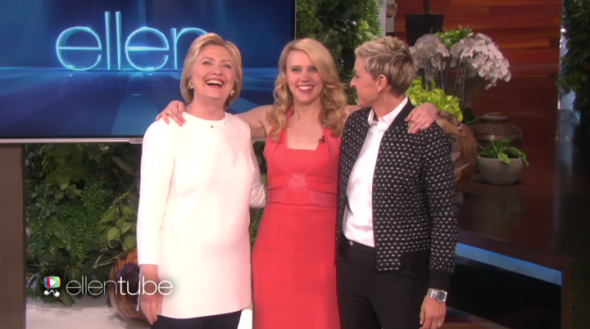The four stars of the forthcoming Ghostbusters reboot, out July 15, visited the Ellen DeGeneres Show on Wednesday to promote the film and show off how skillfully they can play charades in precarious stilettos. The women—Kate McKinnon, Leslie Jones, Melissa McCarthy, and Kristen Wiig—talked about their old jobs (Jones was once a telemarketer for the Church of Scientology) and played a slightly raunchy game of Heads Up, which seems to have some kind of promotional deal with the show—“Ellen DeGeneres” is the clue on the instructional photo on the app’s iTunes page.
All funny on their own, the four comedians are even more lovable together, which bodes well for Ghostbusters. Still, the film’s first trailer has become most disliked movie trailer in the history of YouTube, owing mostly to a few angry communities of misogynist trolls who wish not to see their precious ‘80s franchise sullied by the hand of woman. (To be fair, even from the standpoint of pure comedy, the trailer was pretty disappointing. The second one is much better.) Sony Pictures’ attempt to get the film back on track with male audiences came through loud and clear during the Ellen interview, which focused on just how similar the new Ghostbusters will be to the original. “With all the love we have for the original ones, we’re kind of taking that with new people, new circumstances, I would say, and back in New York City,” McCarthy told DeGeneres on the show. “It has a lot of the good familiar stuff, but it’s new people, and certainly the effects are updated.” DeGeneres helped her along: “And a lot of the original cast. … Do people know that?”
Since Sony has been trying to quell the misogynist outrage over the film, the studio was reportedly not pleased to find that the Ghostbusters cast would appear on the same episode as Hillary Clinton, who’s incited similar outrage among those who hate to see women in roles traditionally occupied by men. According to the New York Times, “the not-quite-joint appearance came as less-than-welcome news to Sony, whose marketing team has been fighting to tamp down what it sees as a misogynistic, Internet-based assault on the movie.” Ellen taped the interviews separately but didn’t do much to differentiate the two while promoting the episode: “This Wednesday, Ellen’s sitting down with some powerful women!” the show’s website said.
Luckily for viewers, the Ghostbusters segment and the Clinton segment did collide, thanks to dreamboat McKinnon, a studied impersonator of DeGeneres and Clinton. She aired her impressions of both, giving Clinton the chance to enjoy a self-deprecating laugh onscreen. Elsewhere in her segment, Clinton played “Who’d You Rather?” to determine her potential vice president, picking Scandal’s Tony Goldwyn over a slew of eminently qualified candidates, including Joe Biden, Jeff Probst, Bernie Sanders, and Kanye West. Clinton also did a cute bit about the possibility of making DeGeneres her running mate. This may please people perennially concerned with Clinton’s ability to experience joy—people like David Brooks, who suggested in Tuesday’s New York Times that people dislike Clinton because she doesn’t have any discernable hobbies, making her seem “Machiavellian, crafty, power-oriented, untrustworthy.” (We can assume the fact that his 800-word argument neglected any mention of sexism was a deliberate statement, not a blind spot.)
In that recent New York Times article, Sony chairman Tom Rothman tried to downplay Ghostbusters’ potential women-related associations to Clinton. “All this attention is great, but I hope [Ellen viewers] realize that Slimer is not a registered voter,” he said of a ghost in the film. Rothman may want to claim political neutrality, but politics do not bend to the rules of movie marketing—Donald Trump himself has already expressed incredulity at the idea of a Ghostbusters film starring women as the title characters. It seems like Sony would like to have it both ways—to bask in the feel-good vibes of lowest-common-denominator girl-power feminism while still soothing the inflamed egos of men who feel threatened by onscreen women with ray guns. The response to Ghostbusters reveals as much about the conservatism of contemporary Hollywood as it does about the entrenched misogyny that keeps women out of title roles and the White House.
